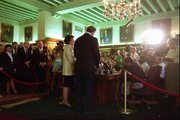As he prepared for a news conference after his May 28, 1996, conviction on federal charges, then-Gov. Jim Guy Tucker didn't have to speak off the cuff.
He'd been given two pages of talking points, carefully crafted and neatly typed, that included the questions he was likely to face and the responses he might want to deliver.
The answers denied all guilt ("All I do know is I'm totally innocent") and criticized independent counsel Kenneth Starr for launching "a selective prosecution, driven by Bill Clinton being President."
At the top, in all caps, the post-trial memo stressed one key piece of advice: "REMINDER: TAKE ONLY A 'FEW' QUESTIONS -- POSSIBLY SIX."
Beneath the 10 typed questions, an 11th had been jotted down.
If asked whether the "people of Ark[ansas] deserve answers?" the 43rd governor should reply: "Certainly. That's why I have answered hundreds of questions. Check your press clippings."
Visitors to the University of Arkansas at Little Rock's Center for Arkansas History and Culture can examine the original copy of the document or a draft of Tucker's July 15, 1996, resignation statement.
They're contained in Box 603, Folders 7 and 8, of the Jim Guy Tucker papers, which have been meticulously organized and cataloged by the center.
The collection also includes research on Tucker's Democratic political rivals.
The former governor's papers went on display earlier this year and are open to the public. The project was funded, in part, by a grant from the National Historical Publications and Records Commission.
Tucker, 74, gave the collection to the center in 2012, and says it is in good hands.
"They have done an excellent job. I mean, they have really done a good job," he said in an interview.
Tucker -- also a former prosecuting attorney, state attorney general, lieutenant governor and congressman -- said there are several reasons why UALR was selected to get the papers.
"I had seen that [former Gov. Winthrop] Rockefeller had left his papers there and some other governors. And it was in Little Rock. And they asked. And I had stored them originally at UALR when I left office," Tucker said.
The papers were initially haphazardly kept, he said.
"As I left office so quickly, there was no advance planning or anything. We just shipped everything over," Tucker said. "I never had a chance to sort through very much of what we sent out there."
Going through the papers was no easy task, according to Deborah Baldwin, the center's director.
"It was a tremendous amount of work because this collection ... was over 700 boxes," she said. And it's been growing ever since, she noted.
"It was originally conceived of as strictly the governor's papers, but he's added papers from his other political offices and, since we've started the project, he's added additional family papers," she said.
As a result, visitors and scholars can peruse more than 100 years of Tucker family history.
At last count, the collection occupied 1,087 document boxes and stretched 542.8 linear feet.
There are six videocassette boxes, seven audio reel boxes, two video reel boxes and two CD boxes, according to Garret B. Kremer-Wright, a research and scholarly communications archivist at the center.
The collection includes James Guy Tucker Sr.'s World War I journal and James Guy Tucker Jr.'s newspaper accounts from Vietnam.
There are also family photos, campaign ads and correspondence from friend and foe alike.
"This is the kind of collection that we love. It's organic, it's alive, it's added to, it provides context for almost any topic that you're interested in," Baldwin said.
Periodically, Tucker will drop off another box of items for the center to process, she said.
The two slim files marked "resignation" share space in a box with documents on the Red River Army Depot and the Arkansas Judicial Retirement System.
Tucker said more resignation-related items will probably be added in the future.
"What I've got on it is probably still buried in the files over at a storage warehouse that we have," he said. "I expect you'll see material on that before I've totally finished."
He's already donated buttons and bumper stickers and funeral home fans emblazoned with campaign logos; an autographed photo from President Jimmy Carter, Tucker's student ID card from Harvard and his press credentials from Vietnam.
Twenty-two boxes are devoted to memorabilia, officials say.
Included in the collection are items about Tucker's grandfather, Guy B. Tucker, a former El Dorado city marshal.
That Tucker was involved in a deadly shootout with a Republican family in 1902 and opened fire on one of the family members again in 1903, fatally wounding the man. Acquitted of murder, Tucker moved to Little Rock, where he went on to serve as state commissioner of mines, manufactures and agriculture, and as a member of the Democratic National Committee.
Guy B. Tucker ran unsuccessfully for secretary of state. His son, James Guy Tucker Sr., served briefly as state auditor.
But James Guy Tucker Jr., an Oklahoma City native who grew up in Little Rock, fared better, winning a race for state attorney general at age 29 and a seat in Congress by the time he was 33.
After a narrow loss in a race for U.S. Senate in 1978 and a landslide defeat in the 1982 governor's race, he won the lieutenant governor's office in 1990, rising to governor upon the election of Bill Clinton to the presidency. Tucker won election to a full term in 1994, only to give it up after his Whitewater-related conviction.
Tucker was convicted of conspiracy and mail fraud in connection with a fraudulent bank loan. He was sentenced to home detention, probation and community service. He was also fined $25,000 and required to pay restitution.
Hal Bass, a political science professor at Ouachita Baptist University in Arkadelphia, said historians will be sifting through Tucker's papers for decades to come.
The process is a little like panning for gold, he said. "You sift through a lot of stuff to find a nugget or two, but that's what academics do."
They "oftentimes give rise to new understandings, new interpretations of what happened," he said. "If you want a full account of a governmental actor's life, I think it's nice and indeed essential to have access to the documentary record."
Tucker's time as governor is especially interesting because of the way he arrived and the way he departed, Bass said.
"I think those beginning and [ending] events obscure what was a very successful governorship. I think Tucker was a fine chief executive, and I would assume that the documents would reinforce that belief. But that's why you study them," he said.
Some of the boxes focus on Vietnam. Honorably discharged, for medical reasons, from the Marine Corps Reserve, Tucker had two stints overseas. While there, he interviewed Arkansas servicemen from across the state and wrote about their lives for newspapers large and small.
He saved photos, interview notes and billing records, plus information on his book, Arkansas Men at War.
There's a lot of information from his late 20s, when he was a prosecuting attorney.
At one point, he went undercover, briefly spending time as a prisoner at the state penitentiary. The "Penitentiary Commitment" paperwork, which identifies him as James Gus Turner, are in the file.
Each of Tucker's campaigns is chronicled, with polling data, donor lists and talking points carefully preserved.
There's also plenty of potential political ammunition.
A file on U.S. Rep. Wilbur Mills includes plenty of embarrassing newspaper articles. Headlines like "She's Still in Love, but Mills Rejected Her, Stripper Says" and "Stripper Says Mills Caused Pregnancy."
There are also plenty of Clinton clippings, such as "Panel questions expenses for nurse for Clinton's baby" and "Clinton using more vehicles despite order."
The files also include a Sept. 14, 1981, letter from a Democratic Party of Arkansas official to Tucker vigorously denying that the party apparatus would be working to ensure a Clinton victory in the primary.
"I, for myself, strongly resent any implication that the Democratic Party is nothing more than a 'tool of Bill Clinton,'" wrote Doug Wallace, the party's executive director at the time.
In addition, the collection contains memos outlining a strategy for defeating "BC" -- Bill Clinton -- in the 1982 Democratic primary.
In one, dated Sept. 21, 1981, political consultant William Hamilton warns Tucker that it would be a "tough race" -- but winnable -- if Tucker could come up with a half-million-dollar war chest.
"You will need the $500k ... [to] build your own image, contrast with BC, possible heavy negative on BC, sustaining your own positive against Clinton, etc.," Hamilton wrote.
To win, "You will have to reach a traditional, conservative, generally rural type of voter you haven't appealed to before," he wrote. "You can't simply be 'less worse' than BC."
A Jan. 11, 1982, memo from Hamilton's firm called for Tucker to launch "a negative attack on Clinton in the last four to six weeks of the campaign."
To defeat Clinton it would be necessary "to demonstrate Tucker's straightforward, outspoken strong leadership style -- not the more fuzzy approach to decisions which Clinton has demonstrated to many," he wrote.
Tucker's campaign jabs evidently annoyed his rival. One headline in the collection reads: "He's 'Done Nothing but Dump on Me,' Clinton Complains in Remarks on Tucker."
But ultimately, Tucker's campaign fell short. He finished third, behind Clinton and former Lt. Gov. Joe Purcell.
Asked about the Hamilton memos, Tucker said he'd forgotten about them and didn't realize they had been included.
"I know a lot of folks have the staff and the resources to have their boxes and stuff edited thoroughly before they deliver them, and I have not been able to do that very much. What was in there was what was in there," he said. "I tried to glance at it, but I'm sure there'll be surprises, and undoubtedly there'll be something that's embarrassing at some point. I tried to avoid putting letters from old girlfriends in there."
Tucker said he trusts the center to determine what's worth keeping.
Officials there say they are thankful that Tucker has entrusted them with his papers.
"This is a whole life. In fact, it's beyond his life and it's other family members and his father and other people he worked with," said Baldwin.
"This is a very, very rich collection. We're really lucky to have it. Historians will love this collection for years to come," she said.
SundayMonday on 08/06/2017

